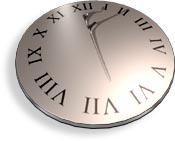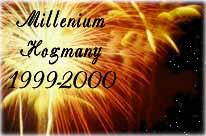
|
This New Year's Eve millions of Scots around the world will celebrate the end of the Millenium  and Hogmanay, the Scottish celebration of the New Year. Hogmanay is bedecked with its own traditions and customs and one can go back a thousand years to learn where these practises originated. and Hogmanay, the Scottish celebration of the New Year. Hogmanay is bedecked with its own traditions and customs and one can go back a thousand years to learn where these practises originated.
At the end of the last millenium, Kenneth III was generally considered King of Scotland, although the country itself did not exist yet. At the last Millenium, Scotland was a largely pagan culture with a smattering of Christianity. Celebration of the New Year took place at various times according to local culture and tradition. The Celts celebrated the passing of the seasons according to lunar and solar cycles and it is generally accepted that the Scottish New Year started with the Spring Equinox on March 21. The darkness of winter was being replaced with the light of spring and the return of life to the world. There were other celebrations also like Imbolc, which was celebrated in midwinter, a great fire festival that celebrated the return of milk to the clans. Ewes do not produce milk until after bearing their young and milk was very important to the survival of the clan in the winter months. There was feasting, dancing and a great bonfire during the celebration.
This left many of the old traditions in places that survive to this day. These include First Foot, Creaming the Well, the Bonfire from the Fire festivals and the wearing of the skins in Lewis. In this tradition, a gang of boys led by one in sheepskin move from home to home, reciting Gaelic rhyme. On being invited into the home, the leader walks clockwise around the fire or a chair while everyone else plummels the skin on his back with sticks. Before leaving, the boys are then given some bannocks for their sack and they continue this ancient custom at another locale. "First Foot"is another tradition that requires people to set out to their neighbors after midnight. They take with them a bannock of oatcake and in many cases a bottle of whiskey for celebration. It is considered by many an omen of the New Year when the first stranger steps through the door. If the stranger is tall, dark and handsome it means good luck, while a light hair stranger is considered ill tidings by many. This might be a throwback to a thousand years ago when Viking raiders frequently came calling and a dark-haired stranger would have definitely been to one's advantage. Writing in TNT Magazine, author Kingsly Mason says, "...the “first visitor” to a house-hold might also have bought a piece of coal or other gift, to ensure prosperity for the house-hold. This may help explain the word Hogmanay, which is generally agreed to mean a gift, originating from an old French word."
All in all, the traditions of Hogmanay are as varied in origins as the people who celebrate it. From Edinburgh, Scotland to Sydney, Australia, from Ottawa, Canada to Washington, USA, wherever you are this New Year, remember Hogmany's ancient roots and enjoy the celebration! BW, December, 1999 Links: Hogmanay: Scotland's Millenium Guide
|
 Technically he was the King of
Technically he was the King of  Christianity brought with it the celebration Mass of Christ and gift giving. These customs slowly started to replace the old Celtic celebrations of the seasons and Fire festivals. But in the 1560's this all changed with the reformation and King James VI. King James VI was a Presbyterian and stoutly anti-Catholic. Christian holidays were banned including Christmas, which left New Years and the festivals for celebration as people normally only took Holy days off. This was further reinforced on
Christianity brought with it the celebration Mass of Christ and gift giving. These customs slowly started to replace the old Celtic celebrations of the seasons and Fire festivals. But in the 1560's this all changed with the reformation and King James VI. King James VI was a Presbyterian and stoutly anti-Catholic. Christian holidays were banned including Christmas, which left New Years and the festivals for celebration as people normally only took Holy days off. This was further reinforced on  Another custom is "Creaming the Well", is where the unmarried lassies run to the local spring or well after the passing of midnight. Creaming the Well could trace its roots back to
Another custom is "Creaming the Well", is where the unmarried lassies run to the local spring or well after the passing of midnight. Creaming the Well could trace its roots back to